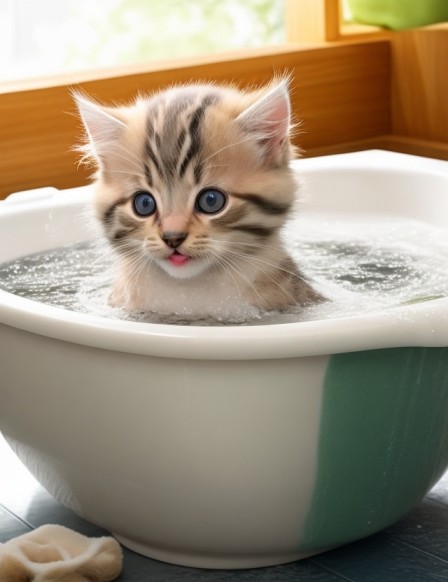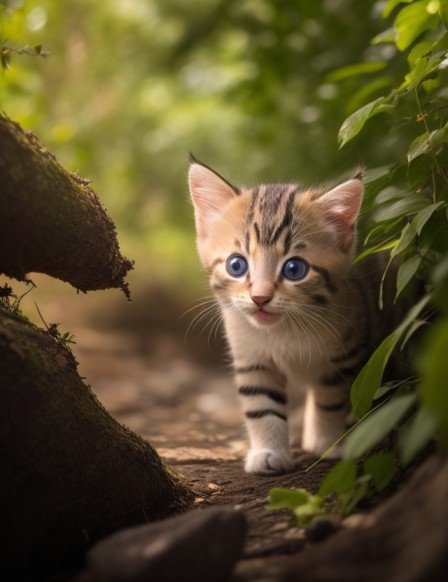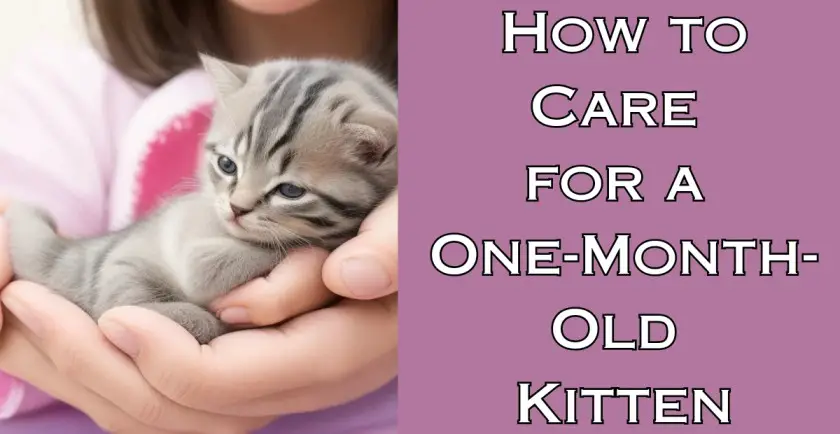Welcoming a one-month-old kitten into your home is an exciting journey filled with love and responsibility. Knowing how to take care for a one-month-old kitten is essential for their growth and well-being during this crucial phase. From creating a safe haven to introducing them to solid food, this comprehensive guide provides you with the insights you need to ensure your tiny feline friend thrives. Caring for a kitten at this age demands attention to its unique needs, such as feeding, hygiene, socialization, and health monitoring. By following these steps, you’re embarking on a rewarding adventure that will not only foster a strong bond but also set the foundation for a happy and healthy life together.
Preparing Your Home for a Newborn Kitten:
Create a Safe Space:

To ensure the safety of your one-month-old kitten, a safe area must be created. Decide on a calm and cozy area of your house to start in. A tiny box or crate lined with cozy blankets works perfectly as a haven. This cozy area evokes the safety of a mother cat’s nest and provides a sense of comfort and familiarity. Place it away from places with heavy traffic and drafts. You can provide your cat a safe haven to feel confident in while they adjust to their new environment by offering an excellent hiding place. This secure environment fosters trust and facilitates their adjustment to your house, guaranteeing a successful beginning to their adventure with you.
Gather Essential Supplies:
Before bringing your one-month-old kitten home, ensure you have all the necessary supplies on hand. These include kitten formula and feeding bottles, soft towels or cloths for cleaning, and a heating pad. Kitten formula serves as their primary source of nourishment, while the bottles are designed to mimic their mother’s nursing. Soft towels are essential for keeping them clean and dry, as young kittens are prone to accidents. Additionally, a heating pad helps maintain their body temperature, as kittens at this age can’t regulate it effectively. Being prepared with these supplies ensures that you’re ready to provide proper care and create a comfortable environment for your new furry friend.
Feeding and Nutrition:
Bottle Feeding:
Bottle feeding your one-month-old kitten is a crucial aspect of their care, replicating the nurturing they would receive from their mother. These tiny creatures need to be fed every 2-3 hours, as their stomachs are small and can’t hold much at once. When preparing the formula, follow the instructions on the packaging carefully, and make sure it’s at a comfortably warm temperature. Hold the bottle at a slight angle to prevent the kitten from swallowing too much air, which can cause discomfort. During feeding sessions, create a calm environment and allow the kitten to suckle at their own pace. This close interaction not only provides nourishment but also strengthens the bond between you and your adorable companion.
Signs of Hunger:
Recognizing when your one-month-old kitten is hungry is essential for responsive feeding. These little ones may display certain cues that indicate they’re ready for nourishment. Watch out for gentle nuzzling movements around your hands or the feeding bottle. They might also make soft mewing sounds and show an interest in sucking on their own paws or fingers. Rooting behavior, where they move their head in search of something to suckle, is another sign. Paying close attention to these signals helps you provide timely feedings, promoting their growth and overall well-being. Responsive feeding nurtures your kitten’s trust in you and fosters a stronger connection between you and your precious furry friend.
Hygiene and Grooming:
Stimulating Elimination:
For your one-month-old kitten, assisting with elimination is a vital part of their care routine. Kittens at this age can’t urinate or defecate on their own, so they rely on their mother’s stimulation. To replicate this, gently take a soft, damp cloth or cotton ball and massage their lower belly and genital area after each feeding. This action imitates a mother cat’s licking and encourages them to relieve themselves. It might take a bit of patience, but this simple process ensures that waste doesn’t build up and cause discomfort. By helping your kitten with elimination, you’re contributing to their health and comfort, providing them with the care they need during this delicate stage of life.
Gentle Bathing:

Bathing your one-month-old kitten should be approached with care and gentleness. While kittens are naturally good at grooming, there might be instances when a bath is necessary. To do this, fill a basin with lukewarm water, making sure it’s not too hot or cold. Use a kitten-specific shampoo to avoid skin irritation. Slowly place your kitten in the water, supporting their body and keeping their head dry. Gently lather the shampoo and rinse thoroughly, ensuring no residue remains. Towel-dry your kitten in a warm room, ensuring they’re completely dry to prevent chilling. Remember, bathing should be infrequent and carried out only when necessary. By following these steps, you can keep your kitten clean and comfortable without causing unnecessary stress.
Socialization and Bonding:
Handling and Interaction:

Interacting with your one-month-old kitten in a gentle and thoughtful manner is key to building trust and a strong bond. Begin by approaching them calmly, using slow movements and a soft tone of voice. When picking them up, support their entire body to make them feel secure. Short, positive interactions are best at this stage, as kittens can easily become overwhelmed. Let them initiate contact, and avoid forcing them into situations they might find uncomfortable. Use playtime with soft toys or feather wands to encourage their natural instincts and stimulate their development. By respecting their boundaries and gradually building a positive relationship, you’ll create a foundation of trust that will shape your kitten’s behavior and interactions as they grow.
Introducing Sounds and Sights:
Helping your one-month-old kitten acclimate to various sights and sounds is a valuable step in their early development. Start by exposing them to gentle sounds around your home, such as soft music or soothing voices. These sounds mimic the comforting environment they’d experienced with their mother. Gradually introduce them to common household noises, like the hum of appliances or distant chatter, to prevent fear of the unknown. Alongside sounds, let them observe subtle movements and visual stimuli in a calm environment. This gentle exposure aids in shaping their confidence and adaptability, setting the stage for a well-adjusted and curious feline companion as they continue to grow.
Health and Veterinary Care:
Schedule a Veterinary Visit:
Bringing your one-month-old kitten to the veterinarian is a crucial step in ensuring their health and well-being. Shortly after welcoming them into your home, make an appointment for their first check-up. The vet will assess their overall health, provide guidance on vaccinations, and discuss preventative measures. During this visit, your kitten might receive important vaccinations that safeguard them from common illnesses. The vet will also offer advice on deworming to keep them free from parasites. Regular veterinary care establishes a strong foundation for their lifelong health, allowing you to catch any potential issues early and provide the necessary care. By prioritizing these visits, you’re investing in your kitten’s long-term happiness and ensuring a healthy start to their journey by your side.
Monitoring Health:
Keeping a watchful eye on your one-month-old kitten’s health is essential for their overall well-being. Regularly observe their behavior and physical condition. Look for signs of normalcy, such as a healthy appetite, alertness, and playful behavior. On the other hand, be vigilant for any signs of illness, such as lethargy, changes in eating habits, vomiting, or diarrhea. Monitor their weight regularly as well, as steady weight gain is a positive indicator of their development. If you notice any concerning symptoms, consult a veterinarian promptly. Your attentiveness and early detection can make a significant difference in ensuring your kitten’s health and addressing any potential issues before they become more serious.
Also Read-
Transitioning to Solid Food:
Introducing Kitten Food:

At around the 4-week mark, you can gradually introduce your one-month-old kitten to solid food. This exciting step in their development prepares them for a well-rounded diet as they grow. Begin by offering wet kitten food, specially formulated to meet their nutritional needs. Start with small portions mixed with a bit of kitten milk formula to create a familiar taste. Gently guide their nose toward the food, allowing them to explore and taste at their own pace. Remember, patience is key; some kittens may take to it immediately, while others may need more time. As they become accustomed to eating solid food, you’re helping them transition toward a balanced diet that supports their growth and health.
Gradual Weaning:
Gradually weaning your one-month-old kitten from formula to solid food is a gentle process that supports their transition to independent eating. Around the 4 to 5-week mark, you can start reducing their formula intake while increasing their exposure to wet kitten food. Begin by mixing a small amount of wet food with the formula they’re used to. Over the next few weeks, gradually adjust the ratio in favor of more kitten food and less formula. Observe their response and adjust the pace accordingly. This gradual approach helps their delicate digestive system adapt to the change and ensures they’re receiving the proper nutrition. By easing them into this new stage, you’re setting the stage for a smooth and successful transition to a diet that suits their growing needs.
FAQs (Frequently Asked Questions)
Q1: When should I start caring for a one-month-old kitten?
It’s best to start caring for them as soon as they’re in your care, as this is a critical developmental stage.
Q2: What’s the importance of creating a safe space for my kitten?
A safe space provides comfort and security, mimicking the warmth of a mother cat’s nest.
Q3: How often should I feed a one-month-old kitten?
Feed them every 2-3 hours, using a proper kitten formula and bottle.
Q4: What are signs that my kitten is hungry?
Signs include nuzzling, mewing, and rooting behavior. Be responsive to their cues.
Q5: How do I stimulate elimination for my kitten?
Gently massage their lower belly and genital area with a damp cloth after each feeding.
Q6: Is bathing necessary for a one-month-old kitten?
While not frequent, a gentle bath might be needed using kitten-specific shampoo if they get soiled.
Q7: How can I build trust through handling and interaction?
Approach them calmly, let them initiate contact, and engage in short, positive interactions.
Q8: Why is introducing sounds and sights important?
Gentle exposure helps them adapt and become more confident in their new environment.
Q9: When should I schedule a veterinary visit?
Shortly after arrival, to ensure their health and discuss vaccinations and deworming.
Q10: How do I transition my kitten to solid food?
Start by mixing a small amount of wet kitten food with formula and gradually increase the food portion over time.
Conclusion:
Caring for a one-month-old kitten demands patience, dedication, and love. By creating a safe space, providing proper nutrition, maintaining hygiene, and building a strong bond, you’re setting the stage for a healthy and happy journey with your new feline companion. Remember, each kitten is unique, so observe and adapt to their individual needs as they grow and thrive in your care.

